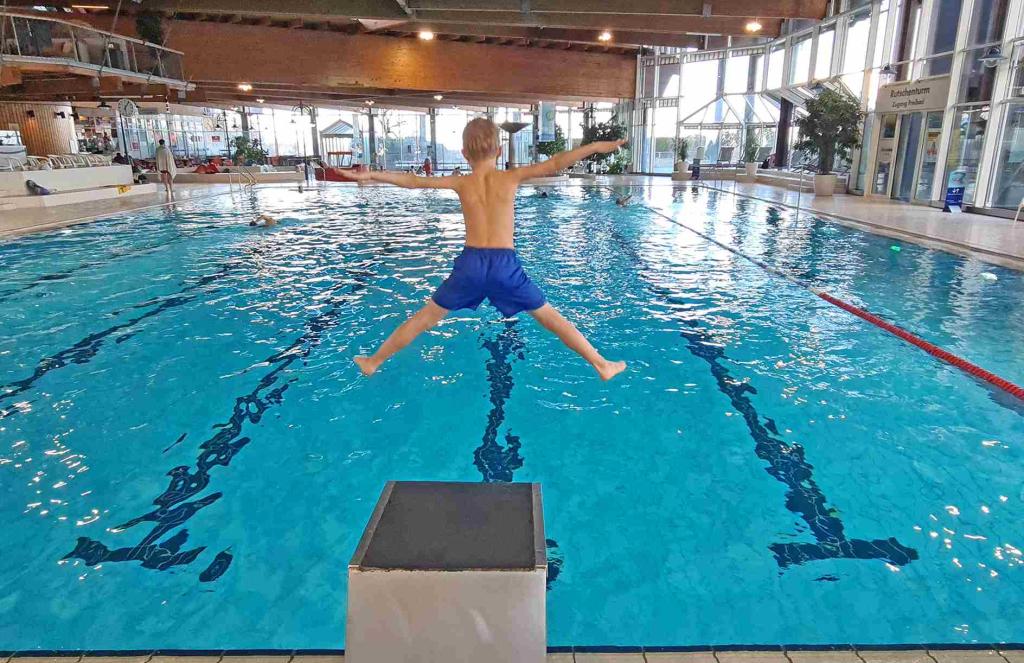Thessaloniki gets ready for its metro launch in November
The underground rapid transit lines have been under construction for almost two decades due to various project delays
 TheMayor.EU logo
TheMayor.EU logo 
The Panorama-Bad pool in Freudenstadt is equipped with AI cameras, Source: Panorama-Bad Freudenstadt / Facebook
The technology can help save swimmers from drowning after being trained to recognize unusual moves in the water
The Baden-Württemberg Public Swimming Pool Association told the German Press Agency (DPA) that the use of AI in the pools is likely to become more and more widespread following one year of a pilot project implemented at the Panorama-Bad in Freudenstadt. And even though there’s a shortage of lifeguards, the innovation doesn’t mean that humans will be replaced by machines.
The swimming pool complex in question trained an AI system to recognize and detect unusual movements in the water and to alert the lifeguards so they can respond more quickly.
The AI camera can send a signal, for example, if it detects a motionless person in the water or if it detects overcrowding in the swimming pool.
Admittedly, the training period of the system meant that there were a lot of false alarms in the process but that is part and parcel of learning, even for a machine. However, and fortunately so, there has not yet been an incident in which lives had to be saved with the help of AI support.
AI-based monitoring in swimming pools is in use in Freudenstadt and Karlsruhe. Other swimming pool operators, for example in Pforzheim, are also planning to do the same.
The spread of AI technology in the swimming pools means that lifeguards will also have to know how to work with it.
"As part of the master craftsman's examination, we are planning, among other things, to assign topics involving AI-based technology as written assignments for supervision in order to reduce inhibitions and bias when dealing with such systems," explained Necdet Mantar from the Baden-Württemberg Public Swimming Pool Association, quoted by SWR.
So-called drowning detection systems have been around for years. What is new about the AI-supported technology is the ability to identify certain movements as a danger before an actual emergency occurs. The new system does not store images in a database, which ensures privacy.

The underground rapid transit lines have been under construction for almost two decades due to various project delays

Now you can get your wine in Talence by paying directly in Bitcoin

That’s because the state has to spend money on updating the railway infrastructure rather than subsidizing the cost of the popular pass

Rethinking renewable energy sources for the urban landscape

The examples, compiled by Beyond Fossil Fuels, can inform and inspire communities and entrepreneurs that still feel trepidation at the prospect of energy transition

Now you can get your wine in Talence by paying directly in Bitcoin

The 10th European Conference on Sustainable Cities and Towns (ESCT) sets the stage for stronger cooperation between the EU, national and local level to fast track Europe's transition to climate neutrality.

At least, that’s the promise made by the mayor of Paris, Anne Hidalgo

The underground rapid transit lines have been under construction for almost two decades due to various project delays

At least, that’s the promise made by the mayor of Paris, Anne Hidalgo

Hostal de Pinós is located in the geographical centre of the autonomous region

Despite its church-y name, the district has long been known as the hangout spot for the artsy crowds

Urban dwellers across the EU are having a say in making their surroundings friendlier to people and the environment.

Forests in the EU can help green the European construction industry and bolster a continent-wide push for architectural improvements.

Apply by 10 November and do your part for the transformation of European public spaces

An interview with the Mayor of a Polish city that seeks to reinvent itself

An interview with the newly elected ICLEI President and Mayor of Malmö

A conversation with the Mayor of Lisbon about the spirit and dimensions of innovation present in the Portuguese capital














